Rick's b.log - 2019/05/19
You are 18.224.30.6, pleased to meet you!
Rick's b.log - 2019/05/19 |
|
| It is the 18th of December 2024 You are 18.224.30.6, pleased to meet you! |
|
mailto: blog -at- heyrick -dot- eu
The promotional paperwork says that it's a big screen (10" or 255mm), it claims to be HD (but then says it is 1024×600). It runs Android 8 Go. Quad core processor, two cameras, and WiFi.
Basically, I'd probably be disappointed if I paid more than about €30 for this. Thankfully I didn't pay. ☺
Here's what's good:
And, now...
In an effort to lure people in less developed countries to the Android ecosystem, Google have created a special reduced version of Android called Android Go. This runs to around half the bloat of traditional Android but, surprisingly, keeps many of its features, so it looks and feels like Android.
Note that the very bottom of the screen is claimed by six icons. From left to right, they are Volume Down, Back, Home, Tasks, Volume Up, and Screenshot.
Unfortunately, as I mentioned, the tablet has a tendency to crash. All to often when pressing the button to wake it up, nothing happens. Also, sometimes when doing stuff, the screen will just go black and... it's died.
Now, I know the traditional explanation is "it's an app" or "an app incompatibility". No, I refute it thus - it's 2019. It's Android 8. A mere app should be in no position to bring down the entire system. That this happens is either a fault in Android Go, or a fault in the version supplied with the tablet.
Which brings me to my next point. Google have released Android Go to those in the developing world to put on lower end hardware. I bet cheap Chinese tablet makers literally wet themselves when Go was announced last year. Now they can flood the market with inferior outdated hardware like, er, this.
However Google may talk big about caring about security but Go has been released on a model of updates come from Google, go to the manufacturer, and then to the end-user. There are no OS updates directly from Google. As such, my tablet has Android 8.1.0 patch level 5th December 2018. I can't imagine it'll ever change. Clearly Google never learned from the farcical mess of earlier Android releases and how infrequently manufacturers and carriers bother to update (indeed, one of the reasons I like Samsung is because they do bother).
Is big. But with 1024×600 spread across ten inches, it is visible. The display is 224mm across and 125mm tall (measured with a ruler). That's a little over 50 pixels per centimetre, or about four and a half per millimetre. You can see that.
I mentioned the problem with different viewing angles. Here's the promised video:
And here is a photo of the tablet outside on a cloudy day! I've stuck on a cheap screen protector. The angle chosen was not intended to show the display at its worst, it was to mimic the sort of angle/proximity of a user, but I had to make it slightly off centre in order that you see anything at all.
The tactile response seems to work reasonably well. You can see the tactile matrix in the sun (no photo, it isn't sunny today) which makes me guesstimate that the tactile resolution is going to be something in the order of 48 or so units across the screen, and maybe 128 down. It's not great, but it's plenty for taps, swipes, on-screen keyboard use and so on. I have not noticed any specific issues when using the pop up keyboard other than it being the Go version so it seems incapable of learning the sorts of words I enter - but that's not a display problem...
In terms of hardware, it's a 1024×600 panel refreshed at a somewhat odd 58Hz and handled by a Mali-400MP GPU (reported by AIDA64, or Mali-T764 according to the datasheet). It looks as if the Rockchip SoC is capable of decoding HEVC at up to 4K@60fps, H.264 at FHD@60fps or 2K@24fps; handling video output up to 2K parallel or 4K HDMI.
Bluetooth is provided, so keyboards and headphones work as expected. It will receive files from other devices, but it seems a bit variable as to whether or not it is able to send files via Bluetooth. Yesterday it didn't want to, today it does...
USB is for charging, and for connecting stuff. Out of the box, you cannot plug the tablet into a PC (or other device). You need to go to the USB settings and switch it to file transfer (MTP) mode. Every time. Then it'll work. Maybe. It worked fine on my S9, but my XP box got stuck looking for a driver for the KL6889, so it obviously wasn't presenting itself as a basic MTP device.
Standard audio output is a standard 3.5mm jack.
There are three buttons. A power button, a hidden (pinhole) reset button, and a button marked ESC that seems to be a hardware "Back" button.
Finally, a slot marked "TF card". What they mean is a micro SD card, but they probably don't have the right to use the SD name or logo, so use the ancient "TransFlash" moniker. That means it likely supports SDHC, for cards up to 32GB. The card is intended for media. Apps and app data cannot be stored on the card. I'm not sure if this is an Android design issue, or if it's a limitation inherent in the Go version.
When you see the top and bottom bars in red in the screenshots, that means the battery saver is active. This blocks background activity, throttles the CPU (whoo, even slower!), and reduces display brightness.
It captures video too. For some reason this video-capable hardware is only able to make really crappy videos at less than 20fps with dreadful audio. I suspect this is the camera rather than the SoC:
The front camera is VGA (640×480). I didn't even bother...
The processor is a quad core ARM Cortex-A7 clocking between 216 and 1200MHz. ARMv7 with NEON supported. Won't set the world on fire, being not unlike an overclocked Pi2, but should it be as slow as it feels? It is a lot more than my first phone (that was basically an OMAP3), yet it doesn't feel it. Perhaps this is an indication of how bloated Android has become in recent years?
AnTuTu requires a 3D plugin that isn't compatible, so I used and Geekbench 4's short test which gave the tablet a score of 730.
Speaking of mediocre, Geekbench 4's full test continually fails to communicate with the server (I've tried three times) and the app is too poorly programmed to cache the results. So we'll just have to make do with the score of 730.
In use, the tablet can just about handle playing a recording of the Eurovision grand final from BBC HD - H.264 video, 1920×1080 at 25fps (1080i), but the UI gets a bit unresponsive as the system is devoting most of its time to playing the video, and the video breaks up when the system can't keep up.
It also runs Firefox. With tabs, as it's a tablet.
But, let's face it. While I may have some productivity apps, the main use for this is going to be watching videos:
And more videos:
And... even more videos:
For that, once you get the display in a good position, it isn't bad. Well, not for a freebie.
Freebie La Poste magazine tablet - Klipad KL6889
A promotional letter arrived from La Banque Postale offering a selection of magazines at a low monthly cost. This was interesting to my mother, as a magazine she currently subscribes to needs to be paid at six month intervals. Paying monthly is a lot less hassle.
As a "hook", those who subscribed to a magazine would receive a "free" tablet. This is not why I chose to subscribe, it was simply a potentially useful extra.
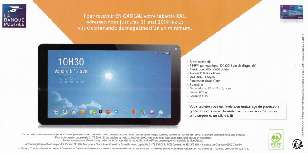
It suspiciously neglects to mention any manufacturer.
Jumping straight in
Having used this tablet for a couple of weeks now, I will get straight to the good and bad and talk about the device later.
The only unusual system app is "android.auto_generated_rro___1.0" which, dumping the APK to disc and looking inside, it seems to be something to do with a power management profile and theming.
There's no Facebook. What a refreshing change!
Also, the display on maximum brightness, isn't. Don't expect to use this outside, or near a window, unless it's dusk, twilight, night time, or post-apocalyptic gloom.
Not helped either by the fact that the 'official' charger is a slow charger, so charges more slowly than the battery depletes.
Android Go
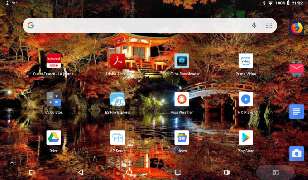
Perhaps the biggest difference is the "Launcher3" home screen. It supports apps and widgets and even handles switching orientation, but it doesn't permit apps to be closer together, nor can one get rid of that annoying Google search bar. Other than that, it suffices as a launcher.
It hasn't entirely died as often a double-press of the power button will call up the camera. And from there I can do an ordered reboot. Otherwise, hold down the power button for about ten seconds to force the tablet off.
The display
![]()
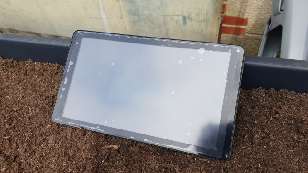
In reality, it struggled displaying a pre-downloaded Prime Video at maximum quality.
Connectivity
WiFi at 2.4GHz in the usual b/g/n forms. Amusingly, the WiFi on this device is still more capable of finding and holding a signal than the iPad Mini. That ought to say something.
The 5GHz band is not supported, and it appears to be IPv6 ready. WiFi direct is supposedly supported, but it's a non-standard implementation using Google's Files Go app.
I decided to dig out my micro-USB OTG adaptor and shove in a wireless mouse dongle. It sort of worked, I think there's a problem with the mouse itself. A media card reader worked as well, which is kind of cool.
Battery
Android reports it as being 900mAh, charging from the official charger at 254mA (why? the charger can output up to 1.5A!).
In life, it seems to lose a percentage point or two ever hour when in standby and with battery saving mode enabled. Or, when being used, expect 3-4 hours max (actual life depending upon workload, screen brightness, etc).
Oddly enough, it isn't possible to set this to come on automatically "except when charging". You have to turn it on manually.
The automatic settings are "at 15%" and "at 5%", which probably translates to "at twenty minutes" and "at five minutes", which isn't so useful really...
Cameras
The rear-facing camera is quoted as 2 megapixel, but it's actually 1.9: 1600×1200. A fixed lens, 35mm focal length and... that's about it. It is slow to transfer a picture, and the quality is pretty poor. Here are some examples. Tablet on the left, S9 on the right (to show what it's supposed to look like).



The heart of the machine
The core is a Rockchip RK3126C with 1GiB RAM (that's a limitation for Android Go). Of the memory, 981MiB is available (I presume the GPU claims the rest?), with about 450MiB kept free.
There's 16GB of Flash on-board, with 12.79GB available for the user after Android's installation.
Which would otherwise be considered the wrong side of mediocre.
In use
I plan to use the tablet with a Bluetooth keyboard and Docs for writing things. Whether or not that drives me crazy depends upon how crashy the tablet turns out to be.
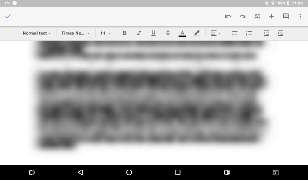
While Firefox takes an eternity to do anything (rather like my XP box!), it is essential. I'd rather wait and know that my selection of crap filters are knocking out the unwanted rubbish on the internet - removing scripts, deleting cookies and destroying tracking links. It's the only sensible way to use the web these days.
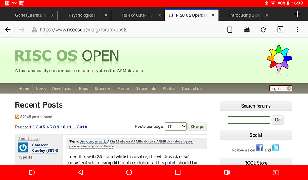


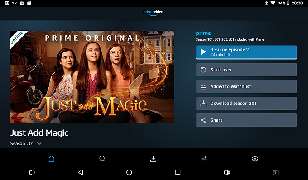
Summary
Don't buy this unless it is seriously dirt cheap.
However, if somebody is willing to offer it for free...
Rick, 20th May 2019, 15:16 David Pilling, 21st May 2019, 13:43 David Pilling, 21st May 2019, 13:46
Usual game of what they claim is not what you get. In China there must be huge battery factories, and the output will be graded and sold to buyers of varying importance.Rick, 21st May 2019, 19:29
Maybe this is why lithium polymer batteries die violently? They pack a LOT of power into a small space.
The 9000mAh is "reported by Android", which could easily be fibbing, however if you look at https://www.tabletpccomparison.net/compare-battery-life/ you will find a chart about halfway down that gives battery capacities - the 2017 version of Microsoft's Surface Pro has a >20Ah battery!Rick, 21st May 2019, 20:28
The missing memory is reserved for ZRAM, a sort of compressed swapfile RAMdisc. Generally frowned upon these days, but making a comeback for the budget build of Android...David Pilling, 21st May 2019, 22:57
I found for the Surface Pro 2017:
45.0 Wh 5,940 mAh, 7.57 V 13.5 hours
It's good and halving the voltage you could claim 12AH - but looking inside there's a lot of battery.
I'd still bet your tablet is fibbing and the batteries don't meet their spec.Rick, 21st May 2019, 23:11
| © 2019 Rick Murray |
This web page is licenced for your personal, private, non-commercial use only. No automated processing by advertising systems is permitted. RIPA notice: No consent is given for interception of page transmission. |